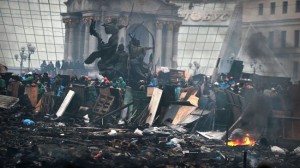 "The country has plunged into chaos and anarchy," Russian Ambassador Vitaly Churkin read from an unofficial translation of the letter while speaking to reporters after an emergency meeting of the U.N. Security Council. "The country is in the grip of outright terror and violence driven by the West."
"The country has plunged into chaos and anarchy," Russian Ambassador Vitaly Churkin read from an unofficial translation of the letter while speaking to reporters after an emergency meeting of the U.N. Security Council. "The country is in the grip of outright terror and violence driven by the West.""People are persecuted on political and language grounds," he read. "In this context, I appeal to the President of�Russia�Vladimir V. Putin to use the armed forces of the Russian Federation to re-establish the rule of law, peace, order, stability and to protect the people of�Ukraine."
Churkin held up a copy of the letter for council members to see during a heated council session in which Western envoys and the Russian ambassador hurled allegations at each other for two and a half hours. He said the letter was dated March 1.
After the Russian ambassador spoke, U.S. Ambassador Samantha Power dismissed Russian claims that Russian-speaking Ukrainians were under threat in the eastern regions of the former Soviet republic.
"There is no evidence that ethnic Russians are in danger," she told the 15-nation council, which is holding its third emergency session on Ukraine in four days, this time at the request of�Russia.
Power said there was "no legal basis" for Russia to justify its military deployments in Ukraine through an invitation from the regional prime minister of the Crimea, adding only Ukraine's parliament could do that.
"Russia has every right to wish that events in Ukraine had turned out differently," she said. "But it does not have the right to�express�that unhappiness by using military force or by trying to convince the world community that up is down and black is white."
Churkin rejected Power's denials and said she appeared to have gotten all her information about Ukraine "from U.S. TV". He repeated Moscow's view that Yanukovich is Ukraine's legitimate leader, not interim President Oleksandr Turchynov.
British Ambassador Mark Lyall Grant also rejected Russian allegations of acts of terrorism and threats against ethnic Russians in Ukraine. "It is clear that these claims have simply been fabricated to justify Russian military action," he said.
He dismissed Yanukovich's letter to Putin as meaningless.
"We are talking about a former leader who abandoned his office, his capital and his country, whose corrupt governance brought his country to the brink of economic ruin, who suppressed protests against his government, leading to over 80 deaths," Lyall Grant said.
He added that he would not rule out introducing a resolution on the Ukraine crisis in the coming days.
'VOICE OF THE PAST'
Despite the sharp exchanges reminiscent of the Cold War, there was no formal outcome of Monday's meeting. Russia is a veto-wielding permanent member of the Security Council and, therefore, can block any actions proposed by its members.
Most council members took the floor to condemn Russia's actions in Ukraine.�China�was careful to not rebuke its ally Moscow, which it has supported on issues involving�Syria�andIran, but the Chinese envoy did voice support for the idea of non-interference in the internal affairs of countries.
Kiev's U.N. envoy Yuriy Sergeyev told the council Russia had deployed roughly 16,000 troops from Russian territory to Ukraine's autonomous region of the Crimea since February 24 , which he said was an illegal invasion. He made clear this was in addition to troops Russia had already deployed to service its Black Sea fleet in the Crimea under an arrangement with Kiev.
Ignoring warnings from U.S. President Barack Obama and other Western leaders, Putin won permission from his parliament on Saturday to use military force in Ukraine. The stated purpose was to protect ethnic Russians after the ouster of Ukraine's Russian-backed president a week ago.
Putin got the green light from parliament after Russian forces had already gained control of Crimea, an isolated Black Sea peninsula with an ethnic Russian majority and where Moscow has long had a naval base.
French Ambassador Gerard Araud compared Russia's intervention in Ukraine to the Soviet-led invasion of Czechoslovakia in 1968 when Warsaw Pact forces crushed attempts by Prague to relax censorship and implement more lenient policies than previous communist governments there.
"We are hearing the voice of the past," Araud said. "I was 15 years old when Soviet forces entered Czechoslovakia. It was the same justification."
The council met on Friday and Saturday to discuss the crisis in eastern Ukraine but took no decisions, as expected. Both meetings highlighted the deep divisions between the United States and other Western nations and Russia, which has a major Black Sea naval base in the Crimea region.
At Friday's session, Ukraine accused Russia of illegal military incursions onto Ukrainian territory, while U.S. and European delegations warned Moscow to withdraw any new military forces deployed in neighboring Ukraine.
Russia, however, said any military movements by Russian forces there were in compliance with its agreement with Kiev on maintaining its naval base there. On Saturday, the United States called for international observers to be deployed to Ukraine.
Power and other Western envoys reiterated the call for monitors at Monday's session. Churkin responded by saying he did not necessarily reject the idea of international observers being deployed to Ukraine, though he did not explicitly support the proposal either.
By Reuters
The Iran Project is not responsible for the content of quoted articles.










